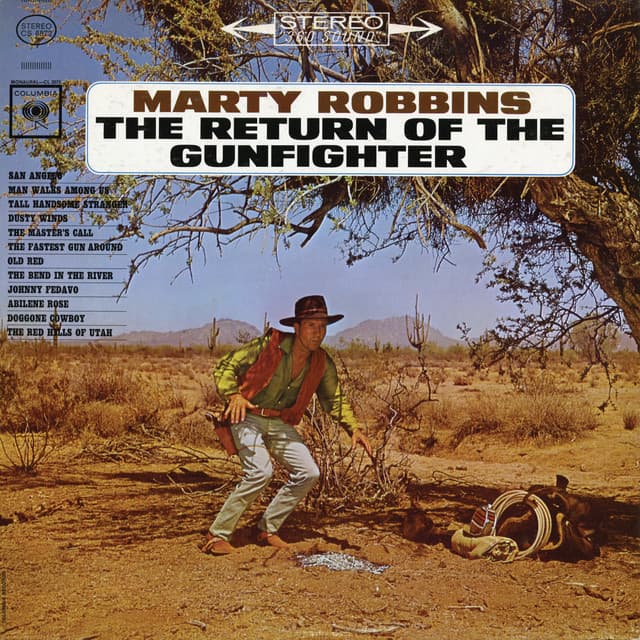
A Fading Memory, A Gunfighter’s Plea: The Unsung Story of Johnny Fedavo
A haunting ballad of regret, love, and the inescapable ghosts of a violent past.
In the hallowed halls of country and western music, few names evoke the same sense of nostalgia and cinematic storytelling as Marty Robbins. He was more than a singer; he was a troubadour of the American West, a balladeer who could paint a vivid landscape of dusty plains, tragic heroes, and fateful duels with nothing more than his gentle, melodic voice and the strum of a guitar. While his monumental hits like “El Paso” and “Big Iron” have been rightly celebrated and passed down through generations, many of his other masterpieces, often nestled quietly on his classic albums, remain a treasure for the discerning listener—a hidden canyon of forgotten tales. One such song, a solemn and deeply personal lament, is the lesser-known but utterly captivating “Johnny Fedavo”.
Released in 1963 on the album Return of the Gunfighter, this track never saw the spotlight of the Billboard charts in the way its famous cousins did. It was an album cut, a deep track, a piece of a larger mosaic that was meant to be discovered and appreciated by those who sought out the whole story, not just the highlights. And what a story it tells. The narrative unfolds not on a grand stage, but in the quiet, reflective space of a man’s memory. The title character, Johnny Fedavo, is not a fictional character born of a songwriter’s imagination, but a figure from the pages of history. While the details of his life are clouded by time and the romance of folklore, the core of the story is an American legend of the kind that fascinated Robbins throughout his life.
The song is a masterful exercise in first-person narrative, delivered with a weary, almost breathless urgency. The listener is taken into the mind of a narrator who, after years of running from his past, finds himself face-to-face with the man who killed his brother—Johnny Fedavo. What follows isn’t a quick-draw showdown, but a soul-baring confession. The narrator, once hell-bent on vengeance, discovers that Fedavo is no longer the brash young man he once was. He’s a broken man, plagued by the very same ghosts that haunt the narrator. The song’s meaning lies in this moment of revelation: the futility of vengeance and the shared burden of a violent past. It’s a poignant reminder that the cycle of violence often leaves two victims, not just one. For those of us who have lived long enough to watch old feuds and long-held grievances fade into the silence of time, the song’s central theme resonates deeply. It speaks to the wisdom that comes with age, the realization that some wounds never truly heal and that forgiveness, even when unearned, is often the only path to peace.
Marty Robbins’s genius was his ability to imbue these miniature Western movies with raw, human emotion. The arrangement of “Johnny Fedavo” is simple, yet powerful—Robbins’s gentle, rhythmic guitar carries the weight of the story, punctuated by a somber fiddle that seems to weep for the men who lost their way. This is not the grand, galloping epic of “El Paso”; this is a quiet, late-night conversation, a whispered secret told over a flickering campfire. It’s the sound of a generation that understood that a man’s honor was not always found in the flash of a gun, but in the humility of his heart. For older listeners, this song is a portal back to a time when men of his caliber, with their rich, narrative songs, were the living historians, the storytellers who kept the spirit of the West alive long after the dust had settled. To listen to “Johnny Fedavo” today is not just to hear a song, but to feel the ache of a long-ago tragedy and to reflect on the quiet grace of a man who finally chose peace over pain.